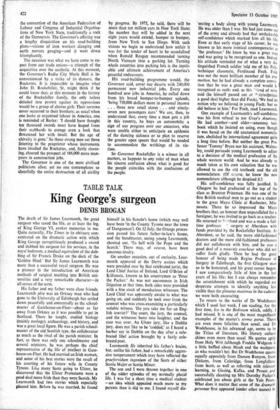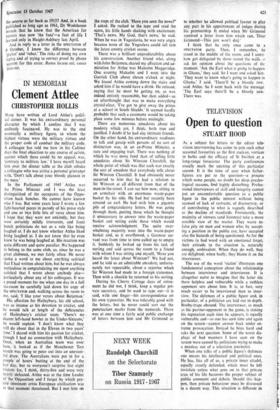King George's surgeon
TABLE TALK DENIS BROGAN
The death of Sir James Learmonth, the great surgeon who saved the life, or at least the leg, of King George VI, evokes memories in me. Quite naturally, The Times in its obituary con- centrated on the dramatic action with which King George surreptitiously produced a sword and dubbed his surgeon for his services, in the royal bedroom, a medical equivalent of the dub- bing of Sir Francis Drake on the deck of the 'Golden Hind.' But Sir James Learmonth was more than a successful royal surgeon. He was a pioneer in the introduction of American methods of surgical teaching into British uni- versities and a very remarkable character—in all senses of the term.
His father and my father were close friends. Learmonth pere was an Orkney man who had gone to the University of Edinburgh but settled down peacefully and contentedly as the school- master of Gatehouse-on-Fleet—about as far away from Orkney as it was possible to get in Scotland. There he taught, studied biology (mainly zoology), archaeology, and history, and was a great local figure. He was a parish school- master of the old Scottish type, the collaborator as much as the rival of the parish minister. In fact, as there was only one schoolmaster and several ministers, he was perhaps the chief representative of the life of intellect in Gate- house-on-Fleet. He had married an Irish woman, and some of his best stories were the result of his courting of his future wife in County Tyrone. Like many Scots going to Ulster, he discovered that the Ulster Protestants were a good deal more Irish than they were Scotch. Mr Learmonth had two stories which especially pleased him. Before he was married, he found
himself in his fiancde's home (which may well have been 'in the County Tyrone near the town of Dungannon'). On 12 July, the Orange proces- sion passed his future father-in-law's house, and the bandmaster, seeing young Learmonth, shouted out, 'To hell with the Pope and the Scotch.' There may, of course, have been amorous rivalry.
On another occasion, out of curiosity, Lear- month appeared at the Derry assizes which were presided over by that celebrated jurist, the Lord Chief Justice of Ireland, Lord O'Brien of Kilfenora, known to his countrymen as 'Peter the Packer.' As was not uncommon in Irish litigation at that time, both sides were provided with a fine stock of mendacious witnesses. The Lord Chief was apparently awake to what was going on, and suddenly he took over from the counsel who was cross-examining a particularly voluble witness. 'Do you take me for an Eng- lish towrist?' The court, the jury, the counsel, and the witnesses burst into laughter, and the case was over. An Ulster jury, like a Dublin jury, does not like to be 'codded,' as I heard a barber say in Dublin on the day after a cele- brated libel action brought by a fairly cele- brated poet.
Learmonth fi/s inherited his father's brains, but, unlike his father, had a remarkably aggres- sive temperament which may have reflected the praefervidum ingenium of the Scots of either Scotia Major or Scotia Minor.
The son and I were thrown together in one of the odder episodes of my normally placid life. I was for a short time a medical student —an idea which appealed much more to my parents than it did to me. I found myself dis-
secting a body along with young Learmonth. He was older than I was. He had just come out of the army and already had that unshakeable self-confidence which marked him all his life. Even at that early stage of his career, he was known to his more ironical contemporaries as 'the professor.' He knew he was a great man and was going to be recognised as one. Indeed, his attitude reminded me of what a very dis- tinguished French soldier told me of his Poly. technique classmate, Ferdinand Foch. Foch was not the most brilliant member of his pro. motion, but he had already a complete convic• tion that he was a great man and would b recognised as such; and, as this '-iend of mine said (he himself passed out of P ilytechnique a good deal higher than did Foch), We had no notion why we believed in young Foch; but we did believe in him.' For Foch, read Learmonth.
One example of Learmonth's self-confidence was his firm refusal to use Gray's Anatomy. He had another—and older—anatomy text- book which he insisted on using, even though it was based on the old anatomical nomencla- ture, abolished by international agreement quite a long time before. But neither the great Pro- fessor 'Tommy' Bryce nor his assistant, Walms- ley, could persuade young Learmonth to adjust to a decision of the medical profession of the whole western world. And he was already so much taken at his own valuation that he was allowed to use the old textbook and the old nomenclature. (Of ccurse, he knew the new nomenclature although he despised it.)
His self-confidence was fully justified. In Glasgow he had graduated at the top of the class as Brunton Prizeman. He was one of the first British medical men to go out as a student to the great Mayo Clinic at Rochester, Min- nesota. There he so impressed the Mayo brothers that, an honour then unparalleled for a foreigner, he was invited to go back as a teacher. He returned to c-"tland and was a made a full-
time professor surgery at Aberdeen with funds provided by the Rockefeller Institute. At Aberdeen, so he said, the more old-fashioned doctors and the more old-fashioned professors did not collaborate with him, and he was a good deal of a mauvais coucheur who did not suffer fools gladly. Then he had the great honour of being made Regius Professor of Surgery in Edinburgh, the first Glasgow man so to be honoured, and his great career began. I saw comparatively little of him in the last years of his life; but I can always remember the astonishment with which he regarded my desperate attempts to identify anything less visible than the glutaeus maxim us in the cadaver we were both excavating.
To return to the works of Dr Wodehouse which I used last week, I am reading, for the first time, Ice in the Bedroom which, oddly, I had missed. It is one of the most magnificent examples of the master's sermo gurus. There are even more felicities than usual, and Dr Wodehouse, in his advanced age, seems to be the Titian of literature. His literary culture shines even more than usual. He quotes aptly from Holy Writ (although Freddie Widgeon is a little baffled about Moab and the washpots, as who wouldn't be). But Dr Wodehouse quotes equally appositely from Damon Runyon, from Dickens, from Coleridge, from Longfellow. from Scott, as well as referring with relevant learning, to Gissing, Kafka, and Proust and successfully cleaning up Mrs Dorothy Parker's celebrated jest about girls at the Yale Prom. What does it matter that some of the dranzazis personae first appeared (under other names) in
the oeuvre as far back as 1913? And, in a book published as long ago as 1961, Dr Wodehouse reveals that he knew that the American for gazers was now 'the fuzz'—a fact of life I learned only in Haight-Ashbury last April.
And in reply to a letter in the SPECTATOR of 6 October, I know the difference between 'grabat' and `rabat.' The risks of doing my own typing and of trying to correct proof by phone account for this error. Roma locum est; causa finila est.



































 Previous page
Previous page